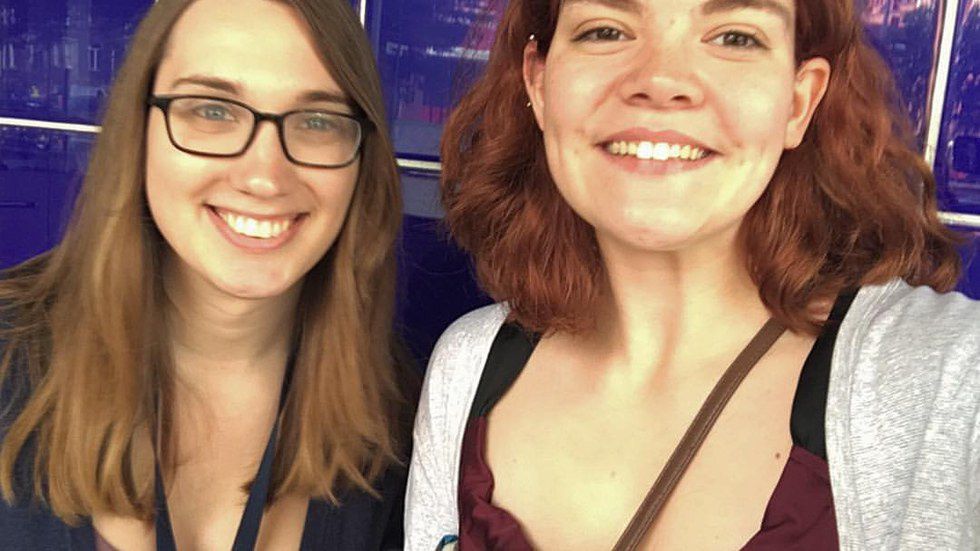When the Supreme Court granted marriage equality in June 2015, many people saw it as the end of a long fight for the lesbian, gay, bisexual, transgender and queer (LGBTQ) community. As a result of that decision, same sex couples are legally allowed to marry in all 50 states. However, in the past year over 200 anti-LGBTQ bills were introduced to legislation. These bills included allowing adoption agencies to discriminate against same sex couples. Yet with the help of advocates for LGBTQ equality, such as The Human Rights Campaign (HRC), the fight for equal rights is still going strong. But this election presents a potential blockade in the progress for equality:
Donald Trump.
Now I could talk all day about the bigotry and hatred of Donald Trump’s politics, but I’m not a professional and many would argue that my opinions carry no substantial validity, so I decided I to talk to an expert on LGBTQ issues:
Sarah McBride, National Press Secretary for the Human Rights Campaign and member of Board of Directors of Equality Delaware, DE’s primary LGBT advocacy organization.
I’m not a professional when it comes to knowing and understanding the history of legislature, but Sarah has dedicated her profession to making sure that LGBTQ rights are recognized by the law as basic human rights. According to her HRC bio, Sarah has
“helped lead the successful effort to add gender identity and expression to [Delaware]’s nondiscrimination and hate-crimes laws. [She has] worked for Governor Jack Markell (D-DE) [and] for former Attorney General Beau Biden (D-DE). Prior to coming to HRC, Sarah worked on LGBTQ equality at the Center for American Progress and [was the first out trans woman intern at The White House.]”
In July 2016, Sarah McBride became the first openly transgender person to speak at a major party’s political convention when she addressed the crowd at the democratic national convention. And although there seems to be a preconceived notion that Trump is more liberal than usual when it comes to LGBTQ issues, even the professional advises that Trump is not the better ticket.
When it comes to direct discrimination against the LGBTQ community, the difference between the two major party candidates is clear.
Hillary Clinton has committed to fight for full equality for LGBTQ Americans. She is dedicated to protecting the marriage equality act and the rights of transgender individuals. Trump, on the other hand, has vowed to appoint Supreme Court justices who would reverse the progress made for the legalization of same-sex marriage, and he believes that states have the right to discriminate against transgender people. And, in our interview, Sarah drew my attention to Trump’s very first governing decision; he appointed Indiana governor Mike Pence as his running mate in this election. Pence is notoriously anti-LGBTQ, and Trump’s selection of Pence as his Vice Presidential nominee speaks volumes about the agenda for America if Trump is elected. Clinton, on the other hand, surrounds herself with allies and selected a pro-equality running mate in Tim Kaine.
Sarah also made it clear to me that when fighting for LGBTQ rights, we need to recognize the presence of other minority groups (such as people of color, people with varying religious backgrounds, immigrants and women) within the LGBTQ community. She emphasized that “nobody [within in the LGBTQ community] is equal until we are all equal” because the reasons behind discrimination of different minority groups are “inextricably linked.” Although their main advocacy is for the rights of the LGBTQ community, Sarah explained that the HRC understands their responsibility to fight for the rights of all minorities and does so by approaching LGBTQ issues with an intersectional lens. When considering Donald Trump as a presidential nominee, Sarah suggests that voters do the same.
There’s a common phrase that goes “Sticks and stones may break my bones, but words will never hurt me.” When the moderator of the second presidential debate mentioned the recent tape that was leaked, in which Trump is blatantly disrespecting the autonomy women have over their bodies, Trump responded by saying that what was said was “just words, not actions.” In my conversation with Sarah, however, she stressed the importance of words. “Words matter,” she told me, “because they create a culture where the things [Trump] says are accepted.” In addition to the vulgar comments he makes on women, Trump has been called out for speaking ill of immigrants and mocking a disabled man.
During our interview, Sarah reminded me of the Maya Angelou quote: “when someone shows you who they are, believe them the first time.” Trump has shown voters time and time again who he is through his words and actions against people of color, people with disabilities, people of varying religious backgrounds, immigrants, women, and the LGBTQ community. Sarah said that if she could remind voters of one thing it would be: “if this election isn’t life or death for you, realize that it is for so many people across the country.” And to the LGBTQ youth who face the discrimination that Trump and Pence stand by, Sarah has this to say:
“There is no wrong way to be yourself. You’re the best expert of your own life. There are people working for you. They love you. You are not alone.”




















